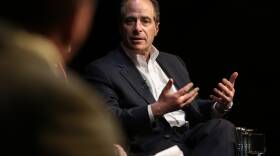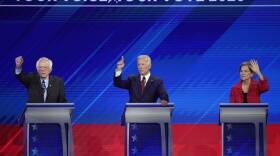EXPLORE MORE
Coming up Thursday on BPR:
Political analyst and podcaster Chuck Todd
Former Massachusetts Secretary of Public Safety Andrea Cabral
United Nation’s Olga Cherevko joins from Gaza
The Culture Show's Jared Bowen
Recent segments
-
Do Dogs Increase Your Lifespan? Sy Montgomery Weighs In
“The Magnificent Migration” author says the study is only the latest in a string of dog-positive research. -
Jared Bowen Reviews 'The Lighthouse' Film
WGBH's executive arts editor gave his latest reviews on film and television. -
Stop Handgun Violence Organization Marks 25 Years Of Activism
John Rosenthal joined the show to advocate for federal gun regulation. -
King: Expect Impeachment To Be Front And Center At Democratic Debate
On Tuesday, the 12 candidates for the Democratic nomination for president will meet for another debate in Westerville, Ohio. -
Medical Expert Applauds Baker And Healey's Tough Stance On Vaping
Dr. John Winickoff, the former chair of the American Academy of Pediatrics Tobacco Consortium and a pediatrician at Mass General, supports Baker’s vape ban, and said the science backs him up. -
Christopher Muther: New Bus Service From Boston To New York City
The Flixbus is promising better bus service for an affordable price.
Listen to previous shows
-

BPR Full Show: A Tax-Free Weekend for a Taxing Week
Today on Boston Public Radio: Senator Elizabeth Warren talks about the MBTA, and the FBI raid on Mar-a-Lago, and took listener calls and questions on an installment of “Ask the Senator.” Retired Judge Nancy Gertner shares her thoughts on Attorney General Merrick Garland’s address on the FBI raid at Mar-a-Lago, unpacking some of the legal statutes involved in the situation. She also discussed why it’s important to our democracy to be able to trust judges, and more. Gertner is a retired federal judge and a senior lecturer at Harvard Law School. Jared Bowen talks about the latest in arts: the Met’s new exhibit “Chroma: Ancient Sculpture in Color;” Now and There’s new exhibit in front of Faneuil Hall, called “Summer Sets,” Patrick Kelly’s “Runway of Love” at the PEM, and BJ Novak’s “Vengeance;” and Leslie Dill’s new exhibition “Wilderness” at the MFA. Bowen is GBH’s executive arts editor and the host of Open Studio. Patty Bourrée explains the impact of Boston’s Drag Queen Story Hour, and how recent white supremacist protests at the events have affected him. Patty Bourrée heads Boston’s Branch of Drag Queen Story Hour. Brian O’Donovan and the Neave Trio join us ahead of their performance at the Rockport Celtic Festival to share a bit about their group and play a few songs. O’Donovan hosts GBH’s A Celtic Sojourn. The Neave trio members are violinist Anna Williams, pianist Eri Nakamura, and cellist Mikhail Veselov. We end the show by asking listeners what they think about sales tax weekend. -

BPR Full Show: All That and a Bag of CHIPS
Today on Boston Public Radio: Andrea Mitchell updates us on the latest national political headlines. Mitchell is the NBC News Chief Washington Correspondent. She is also Chief Foreign Affairs Correspondent, and anchor of “Andrea Mitchell Reports,” which airs weekdays at noon on MSNBC. Then, we open the phone lines to listeners, asking if they would consider getting rid of their manicured lawns in favor of something more natural. Andrea Cabral discusses the FBI’s search of Mar-a-Lago for classified documents. Cabral is the former Suffolk County sheriff and secretary of public safety, and former CEO of the cannabis company Ascend. Tess Gerritsen and Josh Gerritsen shares the history of humans’ complicated relationship with pigs, as told through their documentary, “Magnificent Beasts.” Gerritsen is a Maine-based author. Her and her son Josh are the filmmakers behind the new documentary, “Magnificent Beasts.” Paul Reville talks about declining school enrollment at both the high school and college levels. Reville is the former secretary of education and a professor at Harvard University’s Graduate School of Education, where he also runs the Education Redesign Lab. His latest book, co-authored with Lynne Sacks, is “Collaborative Action for Equity and Opportunity: A Practical Guide for School and Community Leaders.” Jon Gruber explains the economics behind the CHIPS and Science Act. Gruber is the Ford Professor of Economics at MIT. He was instrumental in creating both the Massachusetts health-care reform and the Affordable Care Act – and now can add the CHIPS Act to his resume. His latest book is “Jump-Starting America: How Breakthrough Science Can Revive Economic Growth and the American Dream.” We end the show by talking with listeners about harnessing feelings of envy for motivation. -

Corby Kummer: Much Ado About Cracker Barrel
Award-winning food writer Corby Kummer joined Boston Public Radio to share his thoughts on Hulu’s “The Bear,” Cracker Barrel adding vegan sausages to their menu, and more. -

BPR Full Show: The Walmart of Weed
Today on Boston Public Radio: We begin the show by opening phone lines, asking listeners for their thoughts on the FBI’s raid of Mar-a-Lago. Art Caplan talks about the accessibility issues wheelchair users face while traveling by plane, and weighs in on the resurrection of extinct animals. Caplan is the Drs. William F. and Virginia Connolly Mitty Professor and founding head of the Division of Medical Ethics at NYU School of Medicine in New York City. Juliette Kayyem discusses the FBI’s raid of former President Donald Trump’s home of Mar-a-Lago. Kayyem is former assistant secretary for homeland security under President Barack Obama, and the faculty chair of the homeland security program at Harvard’s Kennedy School of Government. Sarah Larson shares her thoughts on the rise of pickleball in America, and the sport’s potential to bridge the political divide. Larson is a staff writer for the New Yorker. Will Sennott discusses the foreign private equity firms dominating New England’s fishing industry. Sennott is a reporter for the New Bedford Light. Dan Adams updates us on cannabis reforms in Mass., and Maine’s booming medical marijuana industry. Adams is the Boston Globe cannabis reporter, and author of “This Week In Weed,” the definitive marijuana newsletter. We end the show by talking with listeners about the potential disappearance of summer food staples – like lobsters, blueberries, and corn – with climate change. -

BPR Full Show: The FBI's Raid on Mar-a-Lago, and more
Today on Boston Public Radio: Judge Nancy Gertner shares her take on the FBI raiding former President Donald Trump’s home, explaining the legal conditions under which a raid like this could take place, and what kind of consequences could come from it. Gertner is a retired federal judge and a senior lecturer at Harvard Law School. Then, we took listener calls about the FBI raid on Trump’s Mar-a-Lago home. Trenni Kusnierek discusses Serena Williams’ retirement, Tom Brady’s tampering scandal, Aaron Rodgers’ recent podcast conversation about his experience with ayahuasca and Brittney Griner’s chances of coming home. Kusnierek is a reporter and anchor for NBC Sports Boston, and a weekly Boston Public Radio contributor. Chris Burrell shares insights from his investigative reporting on the inaccessibility of Massachusetts' beaches. Burrell is an investigative reporter for GBH News. The second story in his series “Barriers at the Beach” is out now. Then, we take listener calls about their experiences accessing the state's beaches. Corby Kummer talks about what the popularity of Hulu series "The Bear" says about the restaurant industry, responses to Cracker Barrel including a new Impossible Burger on their menu, the carbon dioxide shortage that is hampering the production of beer, and how inflation has made it necessary for more middle-class people to use food banks. Kummer is executive director of the food and society policy program at the Aspen Institute, a senior editor at The Atlantic and a senior lecturer at the Tufts Friedman School of Nutrition Science and Policy. Sean Ellis and Victor Rosario share their experiences being wrongfully convicted and reentering society — including the stark lack of resources for exonerees — and the way that their work helps to try and help smooth the process of reentering society. Ellis and Rosario are a part of the Exoneree Network of the New England Innocence Project, which provides support and empowerment for people who were released from prison after having served time for wrongful convictions. John King discusses the FBI raid on former President Trump’s home Mar-a-Lago, including his thoughts on whether the news helps or hinders Democrats ahead of the midterms. King is CNN's Chief National Correspondent and anchor of "Inside Politics,” which airs weekdays and Sunday mornings at 8 a.m. We end the show by asking listeners what the FBI would find if the agency raided their homes.








